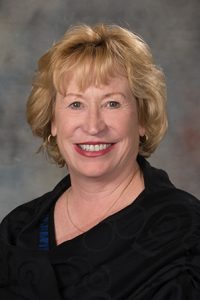Private school scholarship program considered
The Appropriations Committee heard testimony Feb. 6 on a proposal to provide millions in state dollars to fund private school scholarships.

LB1402, sponsored by Elkhorn Sen. Lou Ann Linehan, would appropriate $25 million in general funds in fiscal year 2024-25 to the state treasurer to provide grants to scholarship-granting organizations, who then would use the funds to provide scholarships to eligible students to pay costs associated with attending a K-12 qualified school.
A qualified school is defined as any nongovernmental, privately operated nonprofit elementary or secondary school that complies with certain federal anti-discrimination provisions and fulfills the applicable accreditation or approval requirements established by the State Board of Education.
Linehan said she offered the bill as a replacement for the Opportunity Scholarships Act, which was passed by the Legislature last year. That measure, which she sponsored, allows individuals, passthrough entities, estates, trusts and corporations to claim a nonrefundable income tax credit of up to 50% of their state income tax liability on contributions they make to nonprofit organizations that grant such scholarships.
The Opportunity Scholarships Act was the subject of a successful referendum petition drive and the possible repeal of the law is slated to be on the November 2024 general election ballot.
Linehan said that if LB1402 passes, the previous legislation should be repealed.
School choice in Nebraska currently is limited to those who can afford to move to a new public school district or pay private school tuition, she said, and LB1402 would give thousands of low-income families the same opportunity to choose the best education for their children.
“Nebraskans believe in school choice,” Linehan said.
The bill outlines eligibility requirements for students and contains a formula for scholarship distribution that gives first priority to students who received an education scholarship during the previous school year and their siblings. Second priority would go to eligible students whose household income level does not exceed 100% of the federal poverty level or who have a family member actively serving in the armed forces, and those who are on an individualized education program, are in foster care or are experiencing bullying or harassment, among other criteria.
If the total amount of grants awarded in any fiscal year exceeds 90% of the appropriation to the state treasurer for that fiscal year, the appropriation for the following fiscal year would increase by 25%, not to exceed a maximum appropriation of $100 million.
Brandon Villanueva Sanchez, a neuroscience major at the University of Nebraska at Omaha, testified in support of the proposal. He said private school tuition was a burden for his parents — both of whom were forced to drop out of school in Mexico in order to work – and that scholarships allowed him to attend a Catholic school.
“They told themselves that they were going to do whatever they could to give us the best quality education and, to them, that meant a private education,” Villanueva Sanchez said.
Also testifying in support was Robert Ziegler, superintendent for the Nebraska District of the Lutheran Church – Missouri Synod Schools. Ziegler, who also is the chairperson of the Nebraska Coalition of Nonpublic Schools, said the bill would allow parents to choose a school that matches their values.
“Parents should be free to choose the school entity they believe best meets the needs of their unique family and children,” he said. “I believe this bill puts parents in charge of their children’s education.”
Patrick Graff of the American Federation for Children said giving families options benefits public school students as much as those who choose to attend private schools. Testifying in favor of LB1402, he said states with school choice have seen higher test scores for public school students along with lower rates of suspensions and absenteeism.
“The competition is good for public schools,” Graff said.
Speaking in opposition to the proposal was Scott Norby, representing the Nebraska State Education Association, Nebraska Council of School Administrators, Greater Nebraska Schools Association, Schools Taking Action for Nebraska Childrens’ Education and the Nebraska Rural Community Schools Association.
Norby said the question of whether public funds should be used — directly or indirectly — to fund private schools will be answered by voters at the general election in November. Passing a bill now to accomplish the same goal by different means would “preempt” the authority of voters to use the referendum process, he said.
Rita Bennett also testified in opposition to the proposal, calling it an “end-run around the will of the voters.” Tens of thousands of Nebraskans signed the referendum petition, she said, and it would not be fair to change the rules of the game before those voters have their say at the ballot box.
Executive Director of Stand for Schools Dunixi Guereca opposed LB1402, saying its anti discrimination provision falls short. The federal law referenced in the bill protects only against intentional discrimination based on race, he said, leaving private schools that receive scholarship funds free to discriminate based on sexual orientation, religion and a host of other factors.
Guereca said Nebaska’s long and proud tradition of support for public education that is open to all would be undermined by the proposal.
“An educated citizenry is crucial to the continued functioning of a democracy,” he said. “The best way to ensure that all of our citizens receive a quality education is to support public education.”
The committee took no immediate action on the proposal.

